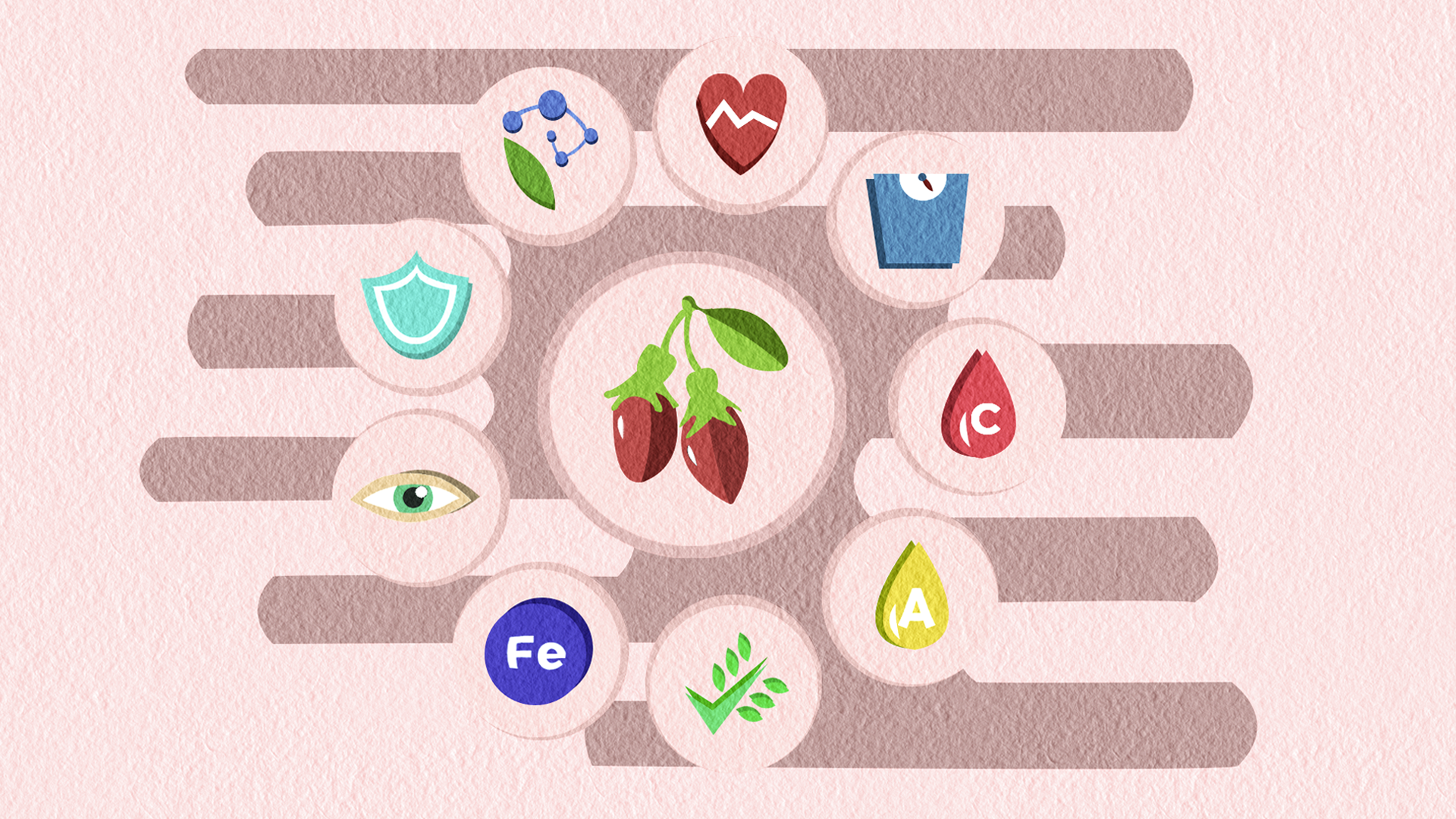The incredible benefits of Goji Berries were known for centuries in Chinese medicine. Today, they have gained the status of superfood, food rich in bioactive compounds that promote better health.
In this article, we will explore how amazing these tiny red wonders are from a nutritional point of view. We will also share a few healthy recipes made with goji berries so that you can try them yourself!
Read on to learn why goji berries are so awesome or skip to the section you are more interested in.
These delicious bright red fruits have been introduced more and more into diets as they are packed with nutrients. They are particularly rich in antioxidants and other powerful compounds that help strengthening your immune system and protecting you from dangerous free radicals.
If you want to stock up your pantry with healthy, functional food, Goji berries are a must-have.
The Berry of Happiness
The Goji Berry (Lycium Barbarum or Wolfberry) is also known as the berry of happiness or red diamond.
According to an ancient legend, the water of a well in a Buddhist temple had become infused with fallen Goji berries from nearby bushes. Whoever would drink such water, would gain great energy, beauty, and well-being.
Historical and Present use in Medicine
These tiny red fruits are native to China, Tibet and other parts of Asia and have been introduced in the western countries only in the 18th century.
Goji berries' medical properties and rich chemical composition have made them a staple in traditional Chinese medicine.
Nowadays, the consumption of Goji berries as a functional food is backed by scientific studies which explain how their bioactive ingredients contribute to the prevention of diseases and promote general health.
Among the many biologically active components found in Goji berries, two of them contribute the most to their health benefits:
Lycium barbarum polysaccharides, a type of carbohydrate specifically found in Goji berries.
Zeaxanthin, an antioxidant compound.
Other functional chemicals include carotenoids and phenolics, which all together contribute to the health-promoting properties of Goji berries.
Goji Berries are a Nutritional Powerhouse
Goji berries are among the richest natural sources of nutrients on Earth. In fact, their nutritional profile shows 46% of carbohydrates, 16% of dietary fibre, 13% of protein, and 1.5% of fat.
This means that they are high in proteins and fibres, nutrients with high biological activities that contribute to many health benefits, which we will discuss below.
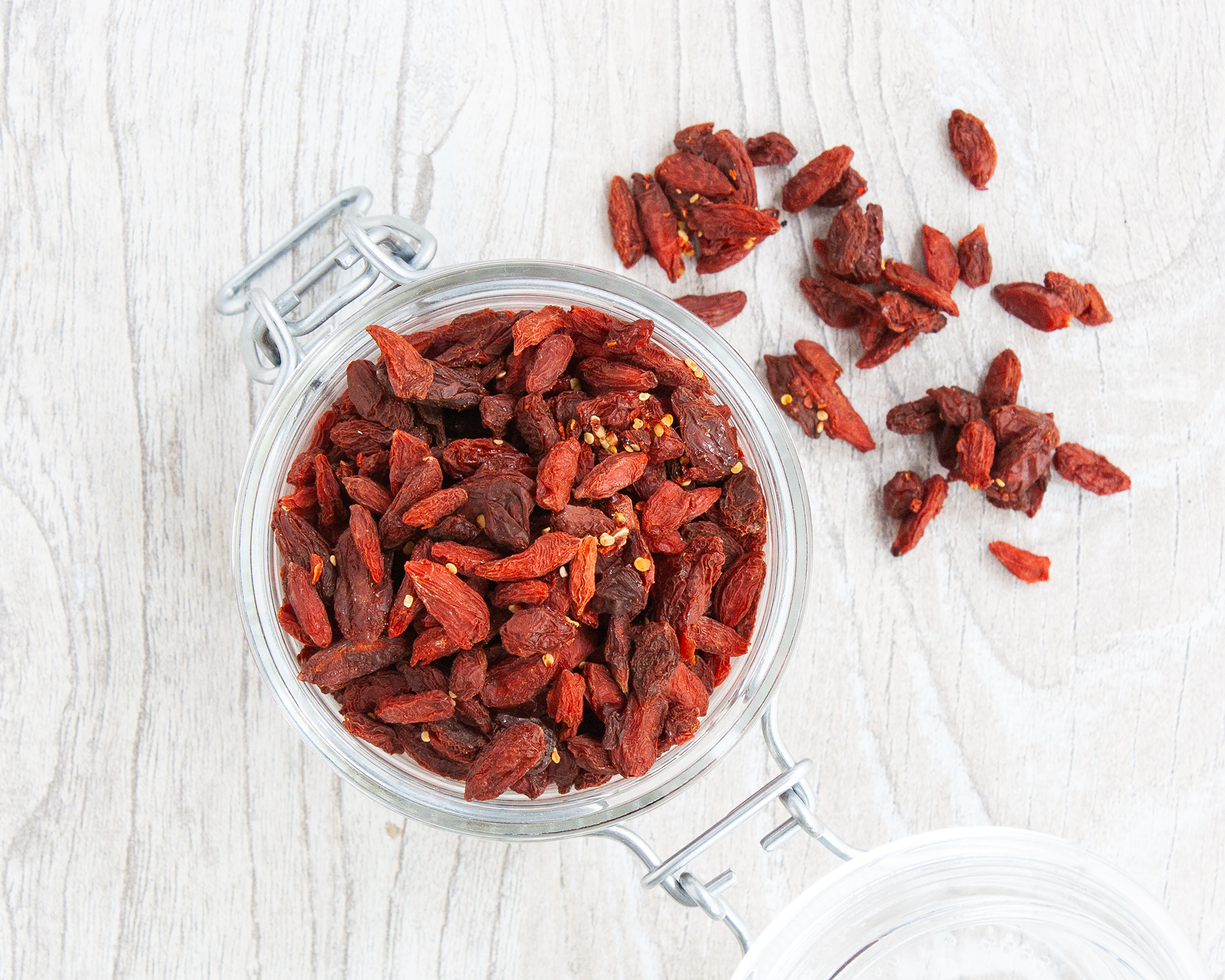
Plant-based Source of Proteins
Goji berries contain 18 amino acids, including all 9 essential amino acids, which means the proteins have a high biological value (HBV). It is quite unusual for plant-based foods to have complete proteins, and only a handful do.
Complete proteins are essential to your body to carry out its metabolic duties. So the fact that goji berries have complete proteins is excellent news for everyone on a plant-based diet.
Moreover, proteins are needed for the growth and maintenance of muscle tissues, and they also carry out important functions in the immune system.
One 30g (1 ounce) serving of dried Goji berries provides almost 10% of your recommended daily allowance (RDA) of protein. That's really impressive for a fruit.
Rich in Fibres
Fibres are the portion of plant-derived food that cannot be totally broken down by the digestive enzymes and play important roles in our gut system.
Introducing Goji berries into your diet will help to boost your fibre intake as one 30g (1 ounce) serving provides almost 4g of fibres.
As the recommended consumption of fibres is 30g per day, you can get 15% of the RDA with just a handful of berries.
Fibre-rich diets are fundamental to those on a weight-management diet, and even more so for people on a low-sugar diet. Not to mention the crucial role fibres play in promoting healthy bowel activities.
As a nutritionist and pharmacist, I believe strongly in the positive impact of fibre-rich foods in our diets. If you are looking to lose weight (or keep it where it is), then check out our fibre-rich meal plan.
Thanks to the combination of insoluble and water-soluble fibres found in Goji berries, these fruits promote bowel transit and maintain a healthy bacterial flora.
Source of Minerals & Trace Elements
Goji berries contain a significant amount of minerals and trace elements essential for fluid balance, oxygen transport, heart rhythm, and many other vital activities in our system.
Goji berries are a mineral source of potassium, phosphorous, copper, magnesium, zinc, and selenium.
In particular, they provide 5% of calcium for healthy bones and teeth, and 11% of iron which will help you feel more energetic.
Loaded with Vitamins & Antioxidants
Besides the bioactive L. barbarum polysaccharide, most of the benefits of Goji berries is due to their many antioxidants and vitamins.
In our body, antioxidants prevent chemical reactions that release free radicals, dangerous compounds which can damage cells and cause oxidative stress. This stress speeds up the process of aging but also leads to the development of inflammatory diseases, heart conditions, and diabetes.
A balance between free radicals and antioxidants is thus necessary for well-being and longevity. Fruits, seeds, and vegetables provide natural dietary antioxidants like vitamins A, E and C.
Goji berries have 500 times more vitamin C than orange and more beta-carotene than carrots, gram per gram.
In particular, within your daily recommendations, a 30g (1 ounce) serving of dried Goji berries provides:
50% of Vitamin C, to fight and resist infections.
20% of Vitamin E, to protect your eye’s retina, lungs and nervous system.
152% Vitamin A, for healthy skin, hair and eyes.
Besides vitamins, phenolic acids and flavonoids are examples of the phenolic compounds found in Goji berries and they have a very high antioxidant capacity.
The Secret to Longevity
Adding a spoon of dried Goji berries to your breakfast bowl can help you maintain a healthy weight in the long term and also prevent cardiovascular diseases and diabetes.
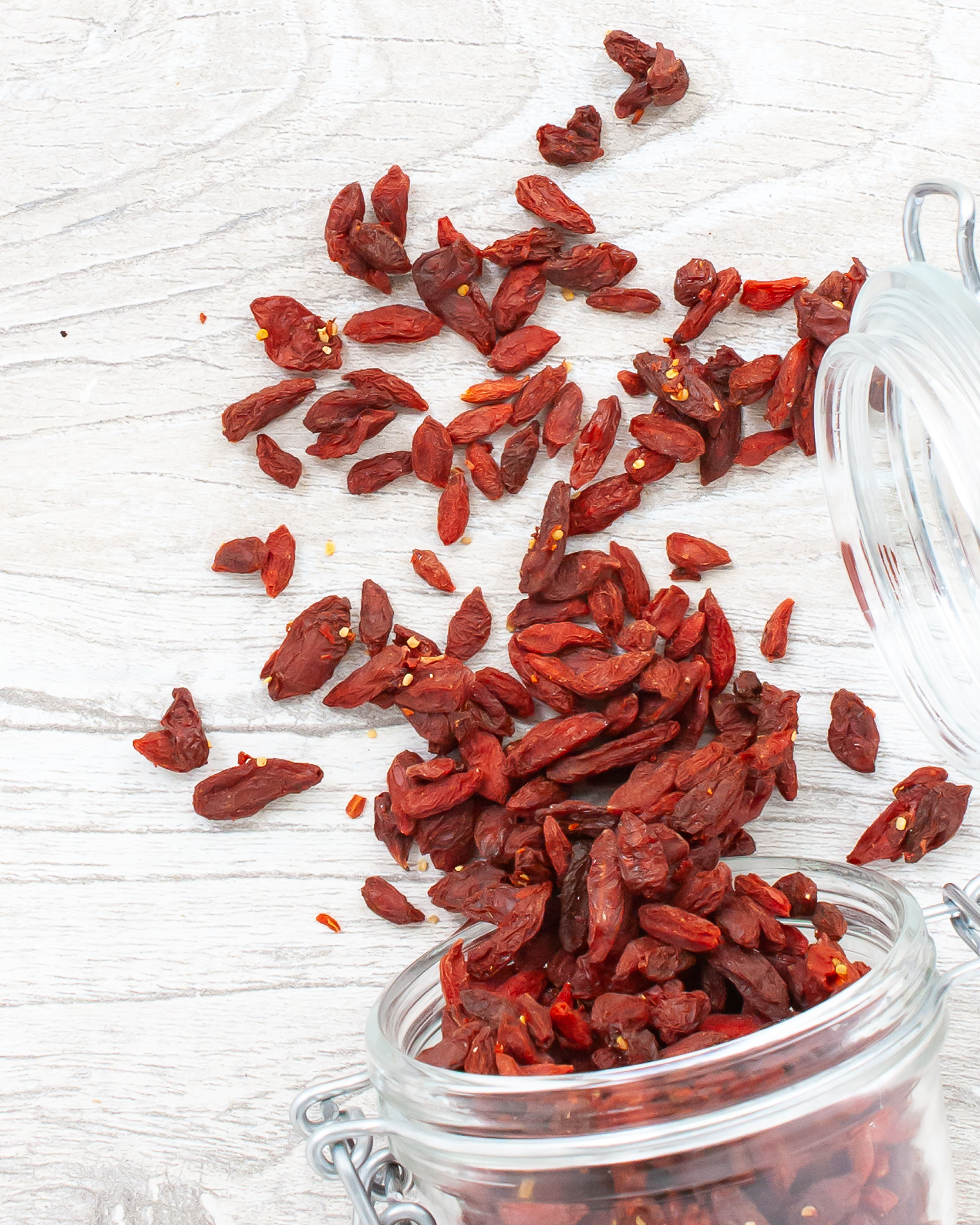
Good for Weight Loss
These small but mighty red fruits are a great ally in weight loss plans. Thanks to their high fibre content, Goji berries will make you feel satiated for longer, reducing the need for frequent snacking and minimising unnecessary calories. They will also promote regularity and prevent constipation.
Prevention of Diabetes
Many scientific studies have shown how Goji berries benefits can have a profound impact in the prevention of diabetes.
In fact, the most important bioactive component in Goji berries, the L. barbarum polysaccharide, is a specific carbohydrate that helps to regulate sugar levels in the blood, affecting the post-meal glucose-insulin response and preventing insulin resistance, key factors in diabetes.
The powerful antioxidants of these berries counteract the oxidative stress caused by elevated blood glucose levels (hyperglycaemia) which contribute to the onset of diabetes.
Reduction of Bad Cholesterol
Scientific studies revealed how Goji berries have lipid-lowering properties.
The antioxidants, fibres, and bioactive polysaccharides contained in these berries have an important role in lipid metabolism, reducing the bad cholesterol.
Goji berries‘ active compounds enhance the endogenous antioxidant system increasing the production of useful enzymes that prevent oxidation of cholesterol—a phenomenon involved in the formation of the atherosclerotic plaque.
This results in increased protection against cardiovascular diseases which are often a consequence of elevated lipid profiles.
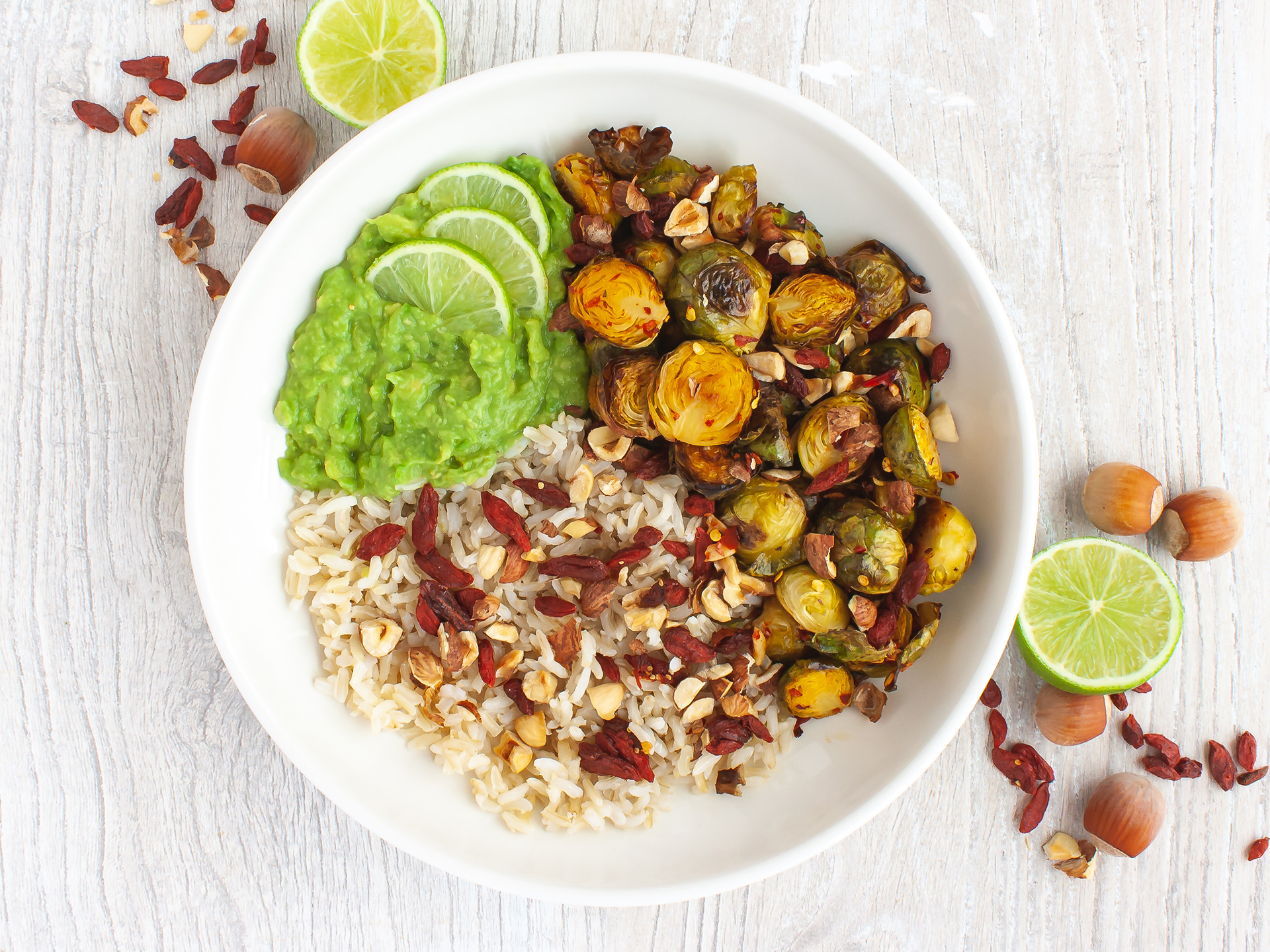
An Ally to Eye Health
Another great element of the Goji berries is zeaxanthin, a carotenoid responsible for their beautiful orange colour which is highly beneficial to the eyes.
Zeaxanthin tends to accumulate in fatty tissues, like the macula, a region of the retina, helping protecting the macula from degeneration due to UV exposure and other oxidative processes.
Even just 15 g of goji berries per day supply 48 mg of zeaxanthin which is considered a beneficial supply of carotenoid antioxidant and can be used as a dietary supplement for eye health.
Immune Boosting and Anti-inflammatory
One the best know benefits of Goji berries is the their immune boosting and anti-inflammatory role.
As free radicals are linked to increased inflammation levels in our system, high concentrations of antioxidants, like the vitamin C in Goji berries, help against stress and disease.
A serving of Goji berries can make you to feel better and recover more quickly from cold and flu.
Recent studies have showed the L. barbarum polysaccharide contained in Goji berries can also enhance the body’s ability to resist disease.
In fact, these carbohydrates are chemically similar to compounds found in echinacea, a traditional herbal remedy to support your immune system, especially during winter.
How to use Goji Berries
The most common types of goji berries used in baking or cooking are dry goji berries. The dry berries look a bit like a raisin but have a wonderful red or orange colour.
Fresh goji berries can be used just as well, but they aren't as easy to find in a store. One thing to keep in mind with the fresh berries is that they may taste quite bitter if you pick them before they are ripe.
The original use of goji berries dates back to 3rd century AD, China, where these berries are used for their medicinal properties and often infused in herbal teas.
But to use goji berries, you first need to know how they taste like and where to buy them. Do they go well with savoury dishes? Are they only good for bakes and infusions? And how many are safe to eat? Let's look into this.
What do goji berries taste and feel like?
The dried berries feel very similar to raisin, but are a little smaller while their flavour is sweet with a mild tangy note.
The small size means these berries are easy to add to bakes, regardless of their size. For example, you could use them to replace chocolate chips in cookies, or use them to add some texture to bread.
The combination of sweet and tangy flavour makes the berries a first choice for sweet bakes. But they are also great to add contrast to savoury dishes.
Are goji berries safe to eat?
If you are wondering how many goji berries you can snack in a day, here's what we recommend.
We recommend a serving of 15g - 30g goji berries per day for a healthy snack under 100-kcal and to enjoy all the benefits of these berries without getting too many sugars.
It’s totally safe to eat Goji berries as they don’t have any general sides effects, unless you are allergic or intolerant to the fruit itself.
But if you are taking some medicines, particularly blood-thinning drugs, it’s better to ask your doctor first.
Also, check in with your doctor if you are pregnant. There isn't a lot of established research on the safety profile of goji berries during pregnancy. Still, due to their many macro and micronutrients your doctor will be able to tell you if they are are a good fit for you based on your medical record.
Where to buy goji berries?
We buy our goji berries in bulky bags on Amazon or Ebay. Yes, we eat a ton!
If we are in a bind, and don't mind spending a little more, we get them at our local supermarket. Here you'll usually find them in smaller bags and heftier price tags.
If we can, we choose the organic options, even if they are a little pricier, just to be on the safe size. This is especially important if the berries don't come from a country that has the same quality of food-safety standards.
If you want to buy the same brand we use, check out our shop page in the pantry section.
Goji Berries Recipes
Now that you learned so many cool things about goji berries, it's time to put them to the test!
Below are some tasty recipes we made using these berries. All these recipes use dried goji berries, as that's what we find in stores. If you have fresh goji berries, feel free to swap them in. Just make sure they are sweet enough for your taste, as the fresh ones can be quite bitter.
We'll show you both sweet and savoury recipes, so that you'll have enough ideas to start experimenting on your own.
Bircher Muesli with Goji Berries and Pistachios
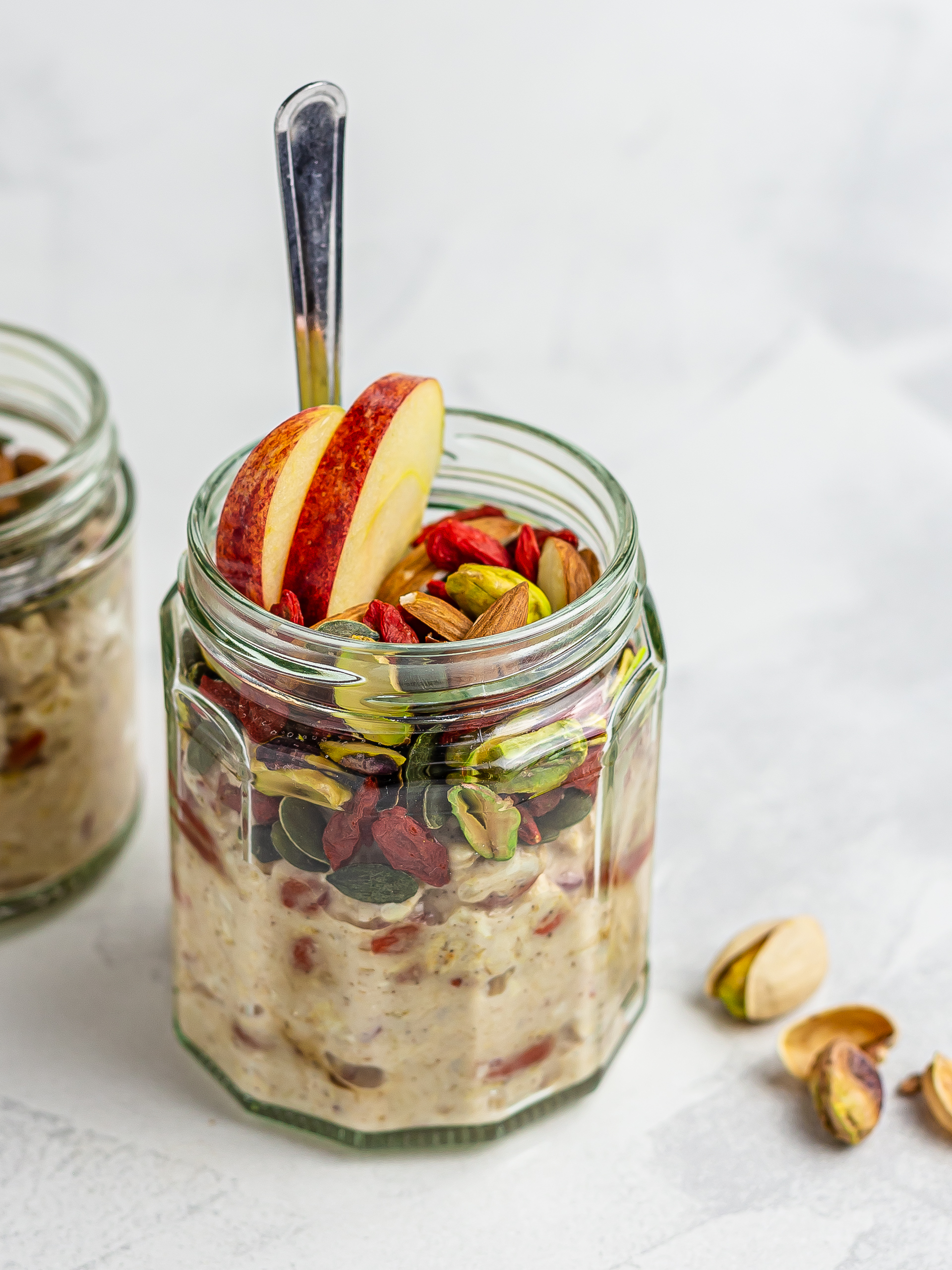
Here is our first sweet breakfast recipe with goji berries: Bircher muesli with Goji Berries and Pistachios.
If you love overnight oats filled with a mix of crunchy and chewy ingredients, then you'll love this recipe!
We made with jumbo rolled oats, juciy apples, pistachios, almonds, pumpkin seeds and a special mix of spices.
Did we mention the muesli is both vegan and gluten-free, and one portion packs more than 30% RDI of proteins and fibres? Yay!
Carrot Cake Energy Bites
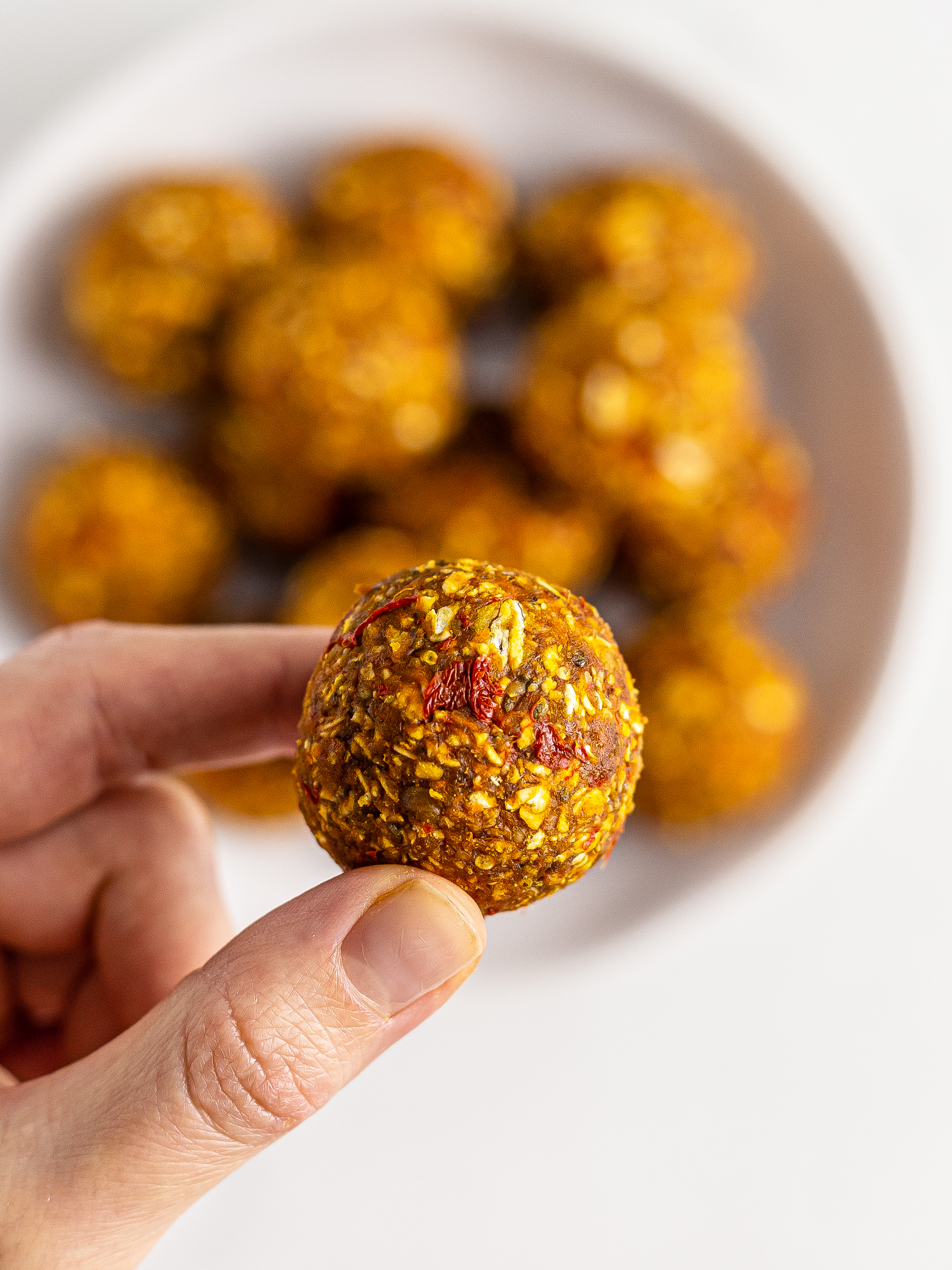
When you need a portable energy booster treat, these energy bites will deliver! Say hi to our superfood power balls.
We made them using a dough similar to that of the famous carrot cake, hence the name! And of course, we stuffed them with generous amount of goji berries.
Imagine that each bite is just 95 calories and a serving of three will net you over 30% of your fibre RDI, 20% of your protein RDI. All with just 1 gram of saturated fats.
Vegan Avocado Cookies
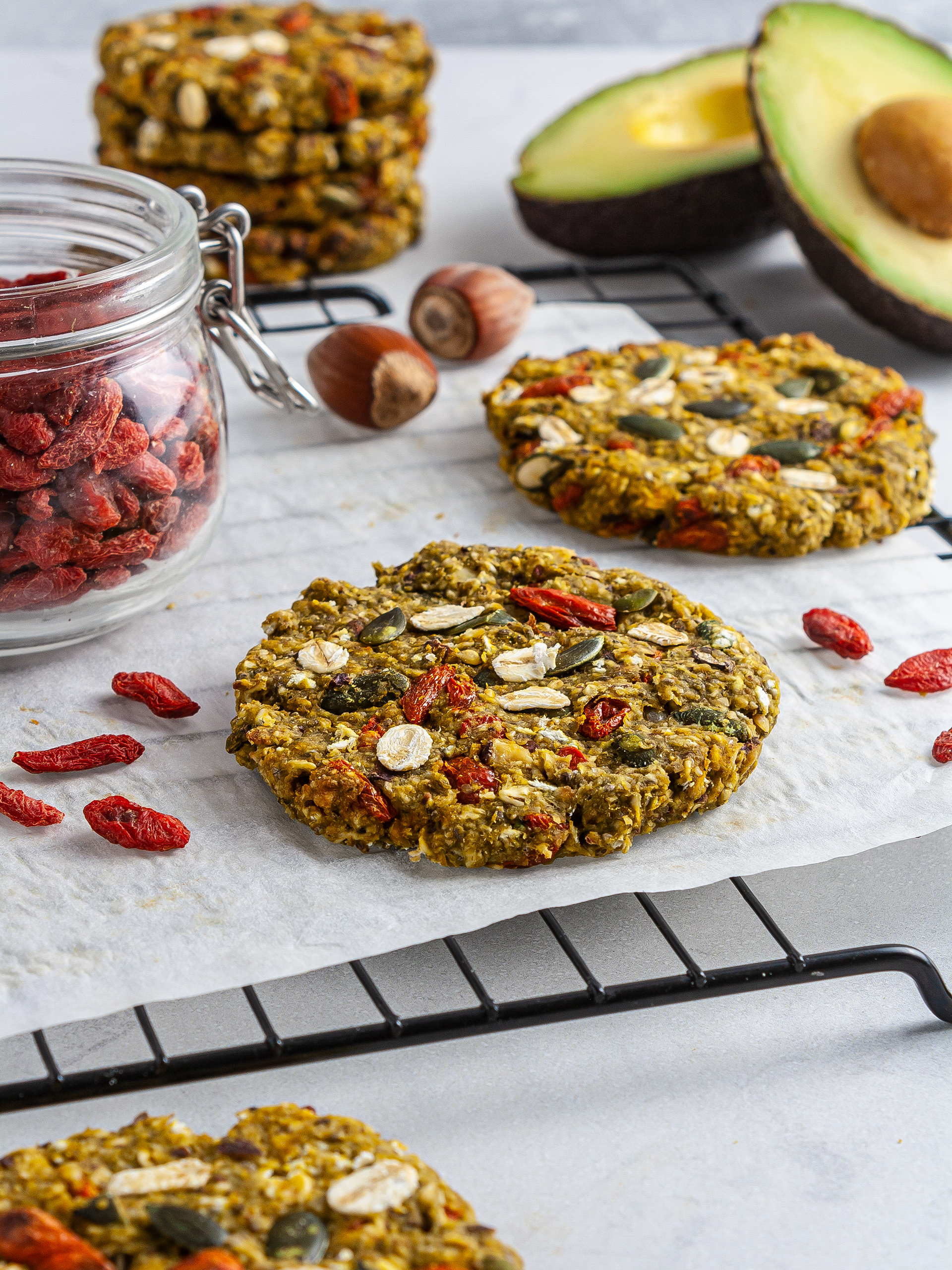
We know what you are thinking.
"What if I use goji berries instead of chocolate chips to make cookies?". We got you!
These super healthy vegan cookies not only pack all the amazing benefits of goji berries, but those of avocado too!
Omega-3 booster cookies, to the rescue!
Matcha Granola Bars
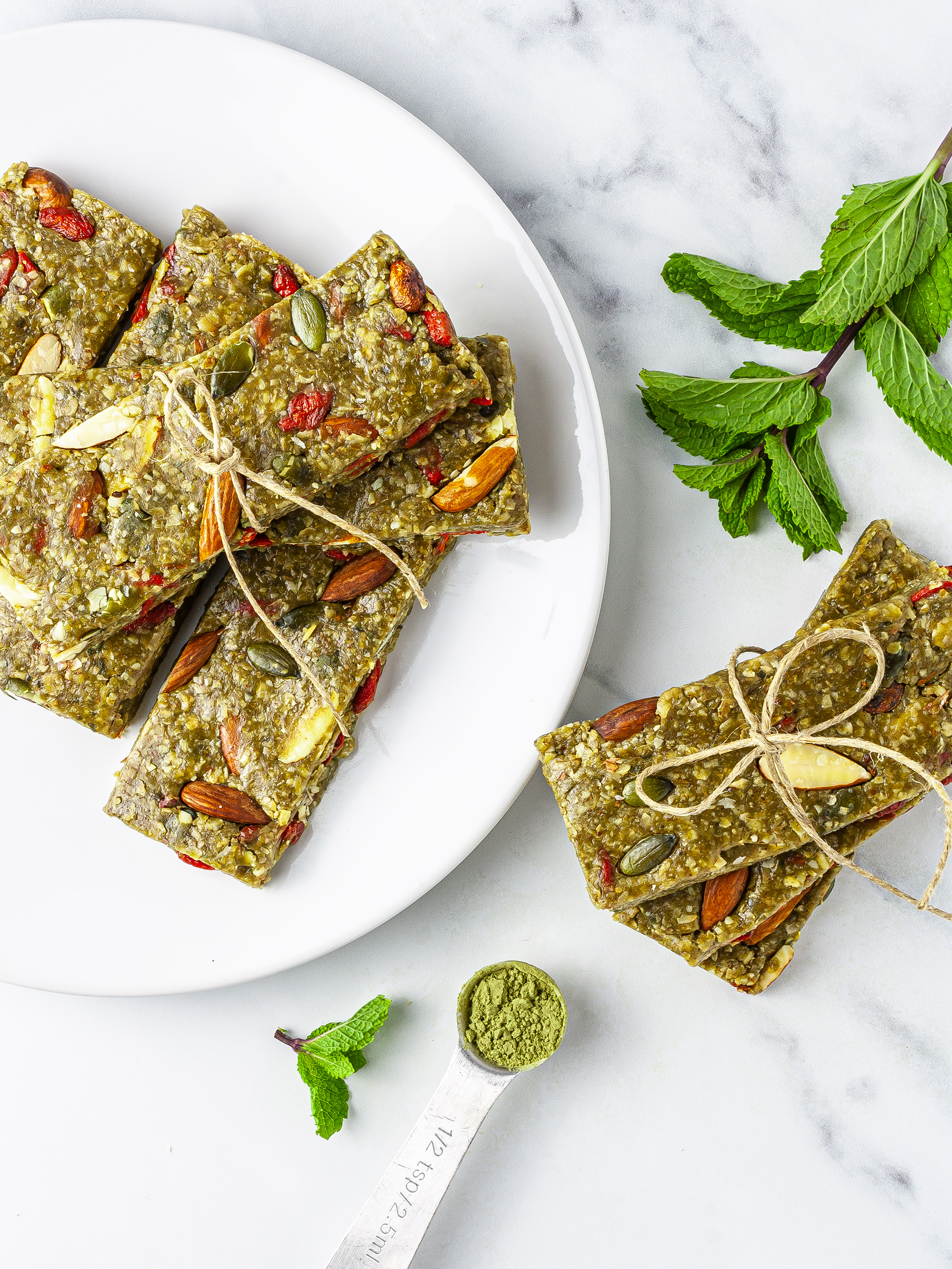
As if matcha powder wouldn't be healthy enough, we scattered these cute bars with goji berries, almonds, and pumpkin seeds.
Even alone the benefits of matcha powder would make this recipe shine. But matcha and goji berries together? Well, now we are talking super!
And the nice thing is that these bars are ready in just 30 minutes. Check them out.
Moroccan Cauliflower Rice with Goji Berries
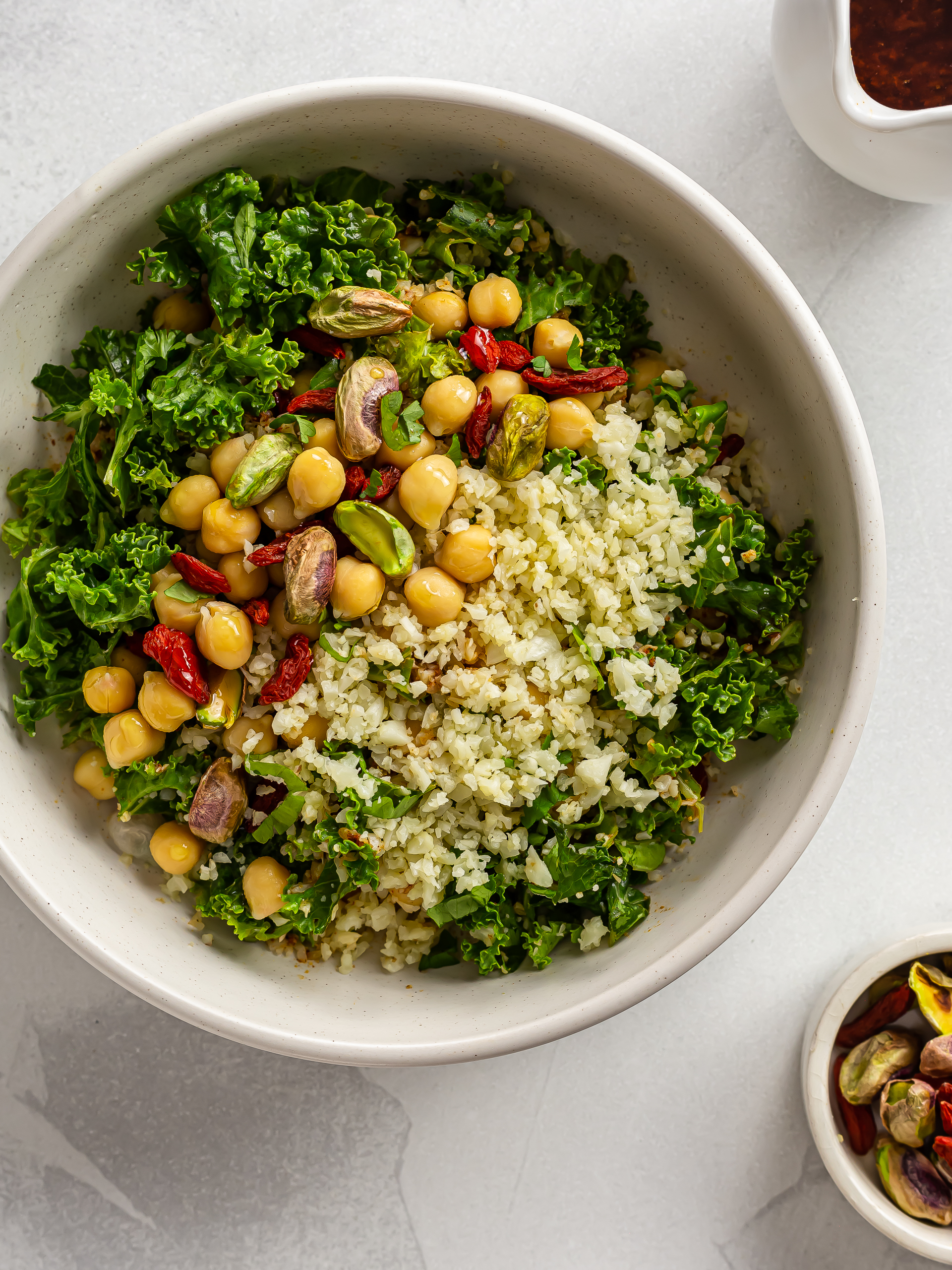
Ok, let's look at a few savoury dishes that use goji berries now.
First on the list, this wholesome one pot dish combines the spiciness of Moroccan cuisine with the delicate sweet flavour of goji berries. What a combo!
But what makes this Moroccan cauliflower rice shine is just how nutritious it is. One medium sized bowl while covering only 25% of your daily calorie intake, will net you over 50% of both fibres and protein RDI.
Plus, it's in your bowl in just 30 minutes.
Miso Marinated Tofu with Edamame and Goji Berries
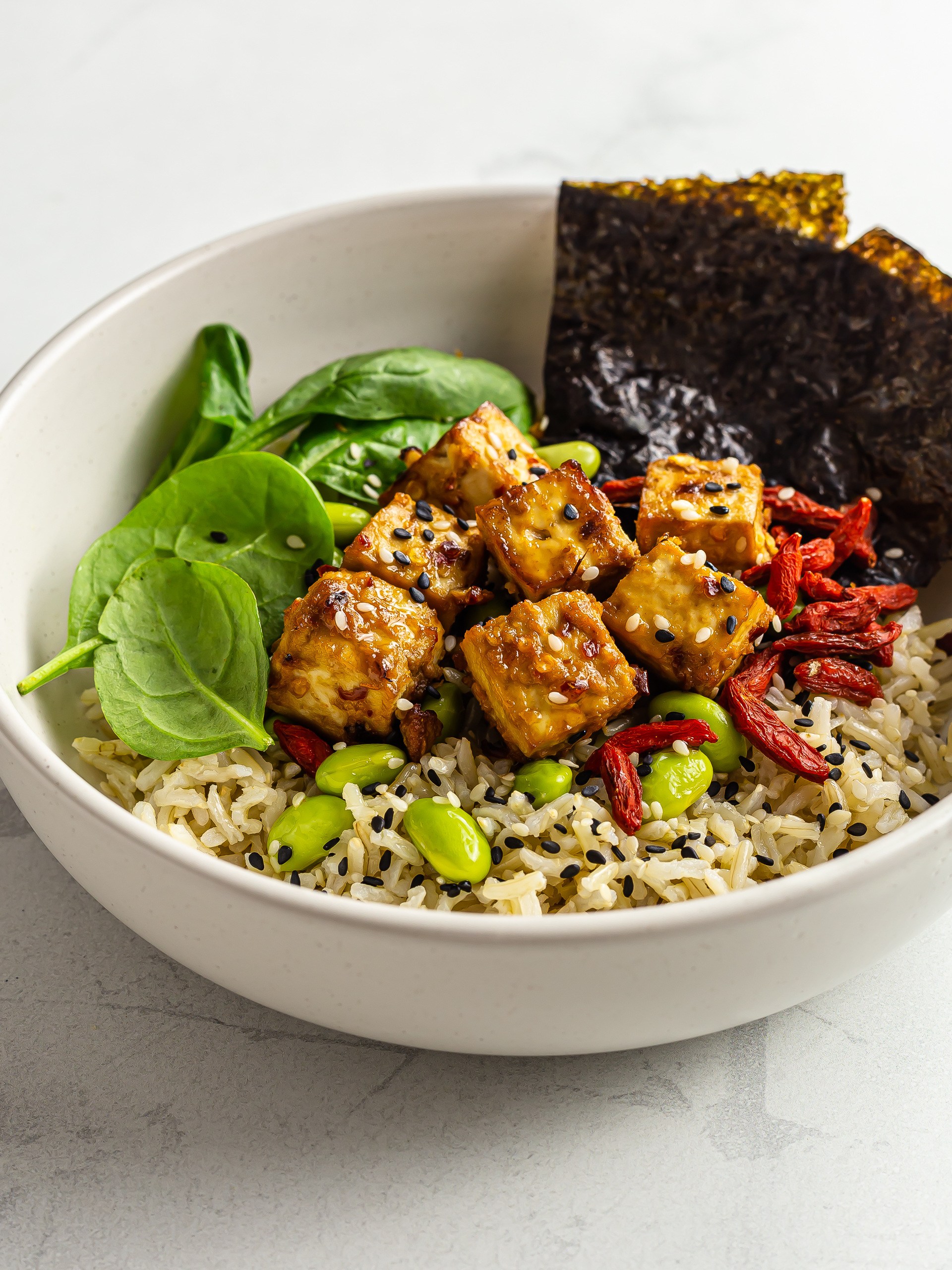
This miso marinated tofu is a big favourite with our readers. And if you love the rich umami flavour of miso paste, we think it'll become one of your favourites too!
Tofu may be a bit bland on its own, but trust us: bland doesn't belong in the same sentence as edamame and goji berries. This power duo brings the dish a mix of saltiness and sweetness that is just too good to pass on.
The recipe is both vegan and gluten-free, and even suitable for folks with nuts allergies. Although people with soy allergy will have to keep scrolling.
Chilli Lime Roasted Sprouts with Hazelnuts and Goji Berries
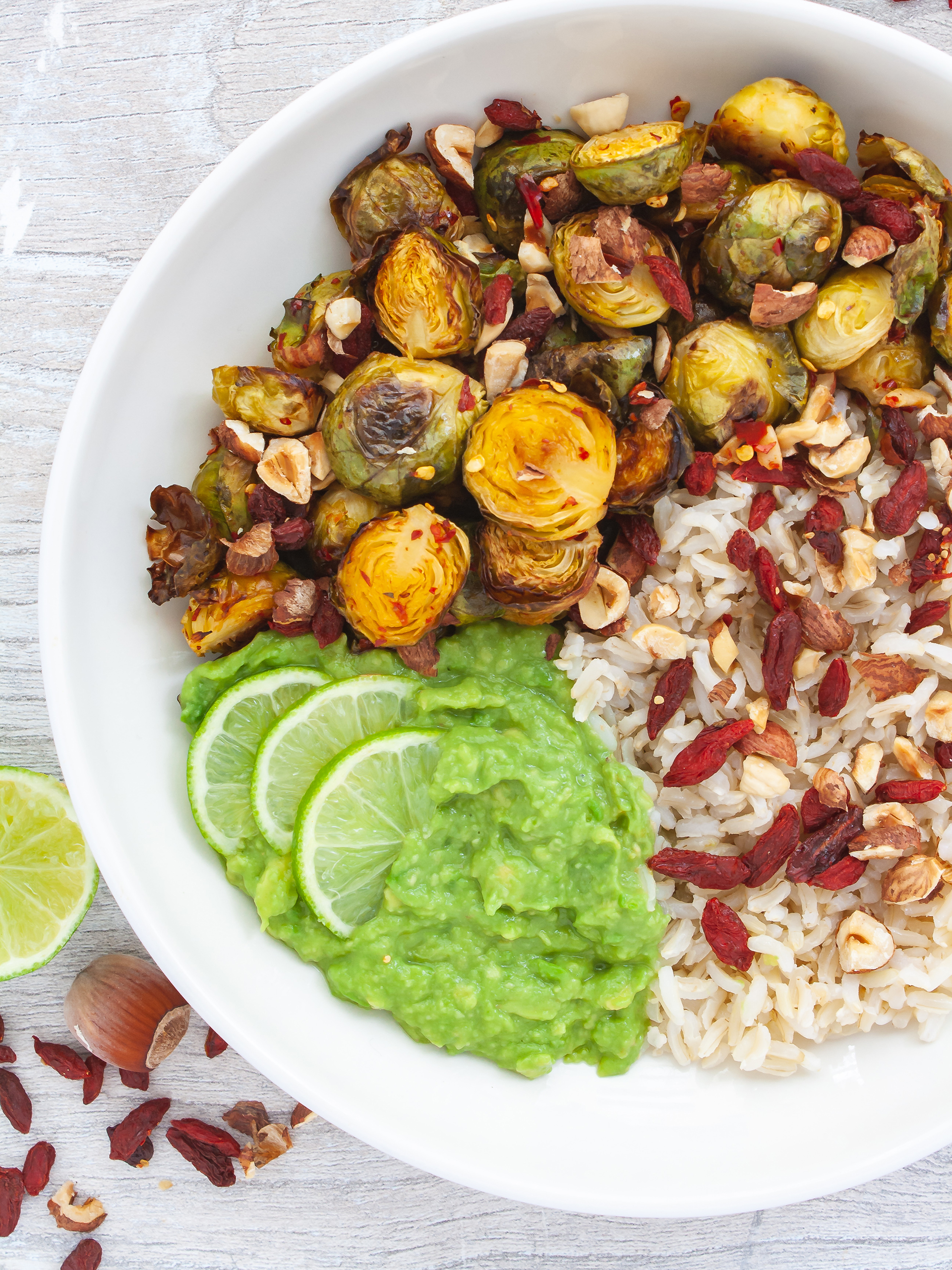
These chili lime brussel sprouts are another prime example of how versatile goji berries are.
Spicy and sour sprouts sit on a bed of brown rice and are held together by a smooth avocado cream. What else? Crunchy hazelnuts and goji berries, that's what! There are so many contrasting flavours at play here — truly special.
Chinese Goji Berry Soup with Roasted Peppers
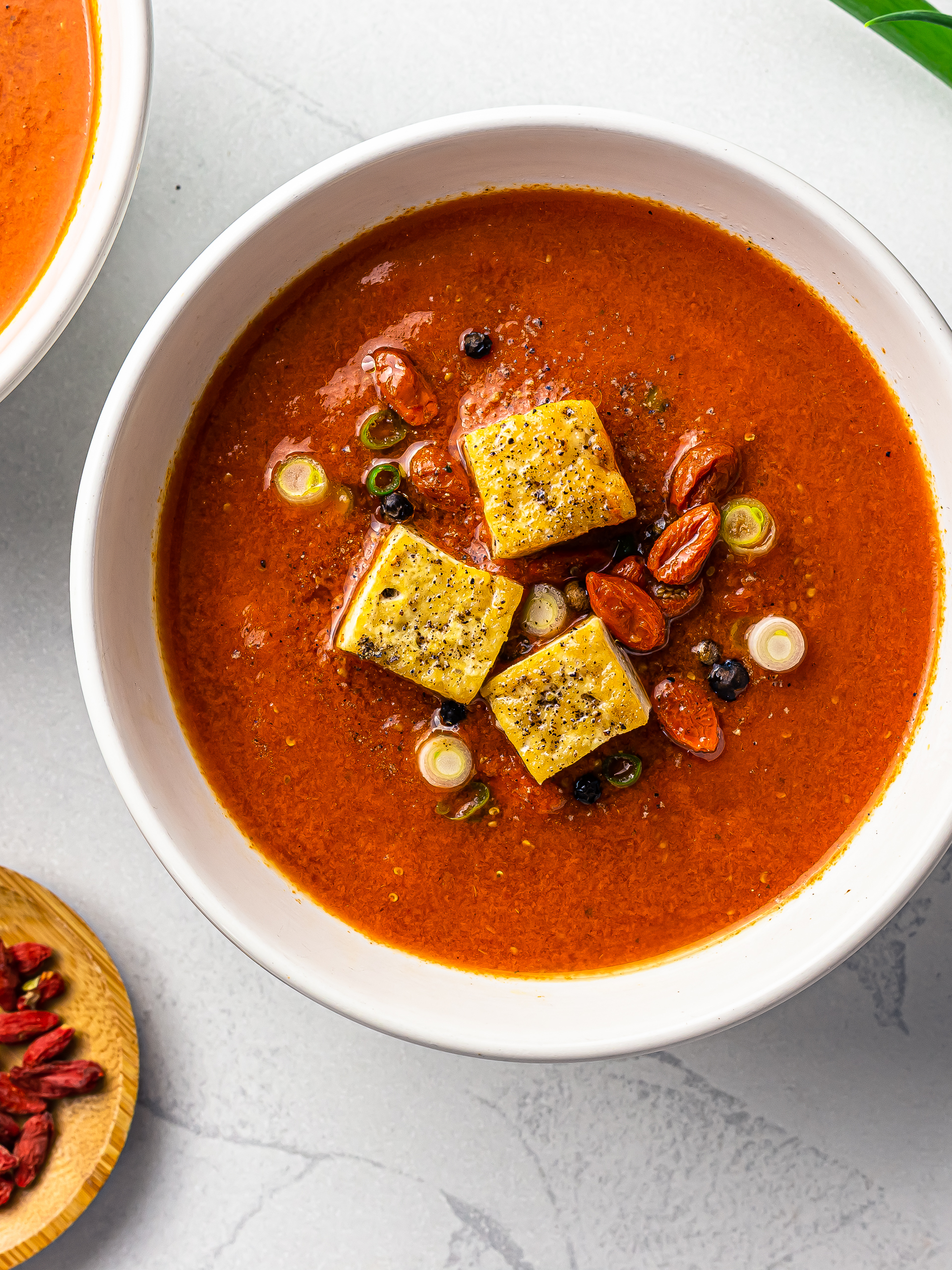
If you've never tried Goji berries in soups, you're in for a treat!
Here we whizzed them with roasted peppers into a colourful broth that's as pretty as delicious.
Top the soup with our stir-fried sesame tofu for a blast of plant-based proteins.
Goji berries are truly remarkable. If not for their impressive nutritional profile, then for their versatility in the kitchen.
We hope you'll enjoy our goji berries recipes above. They are a good mix of different dishes, so you should have a good base to then start experimenting with this precious ingredient on your own.
If you enjoyed the article, please share it with your friends, and subscribe to our newsletter to get the healthiest recipes straight into your inbox.
References
Free radicals, antioxidants and functional foods: Impact on Human Health. V Lobo et al. Pharmacogn Rev, 2010, Jul-Dec, 4(8): 118-126
Goji Berries as Potential Natural Antioxidant Medicine: an Insight into Their Molecular Mechanisms of Action. Zheng Feei Ma et al. 2019, Oxidative Medicine and Cellular Longevity.
Goji Berry (Lycium barbarum): Composition and Health Effects – a Review. Bartosz Kulczyński, Anna Gramza-Michałowska. Pol. J. Food Nutr. Sci., 2016, Vol. 66, No. 2, pp. 67–75 DOI: 10.1515/pjfns-2015-0040
Nutritional Evaluation of Fresh and Dried Goji Berries cultivated in Italy. S. Niro et al. Ital. J. Food Sci., vol 29, 2017
Superfoods: Recent Data on their Role in the Prevention of Diseases.
ISSN: 2347-467X, Vol. 06, No. (3) 2018, Pg. 576-593 Current Research in Nutrition and Food Science

